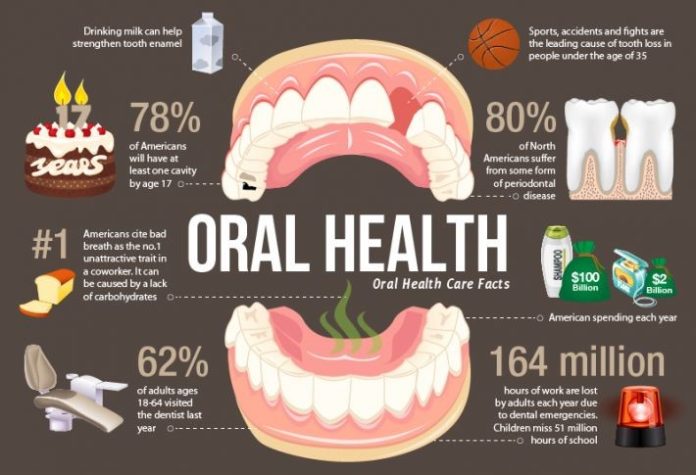Maintaining good oral health is crucial for overall well-being, yet many people neglect this aspect of their health. Poor oral health can lead to a range of problems, from tooth decay and gum disease to more serious conditions like heart disease and diabetes.
Fortunately, there are simple steps you can take to improve your oral health and prevent these issues.
- Develop a Regular Brushing and Flossing Routine
Maintaining good oral health is best achieved through consistent brushing and flossing. Experts suggest brushing your teeth twice daily for a minimum of two minutes with a toothpaste containing fluoride. It’s also advised to floss at least once per day, preferably before going to bed, to remove food particles and plaque that contribute to tooth decay and gum disease.
When brushing, use a soft-bristled toothbrush and clean all tooth surfaces, including the front, back, and tops. Additionally, don’t forget to brush your tongue to remove bacteria and freshen your breath.
To maintain optimal oral health, it’s recommended that you replace your toothbrush every three to four months, or sooner if the bristles become frayed.
- Adopt a Healthy Diet
Eating a healthy diet is not only good for your overall health, but it can also help keep your teeth and gums healthy. Avoid sugary and acidic foods and drinks, such as candy, soda, and sports drinks, as they can destroy tooth enamel and lead to the one thing nobody wants: cavities. Instead, do your best to eat lots of fruits and veggies, whole grains, and lean meats.
Drinking water is also important for oral health, as it helps to rinse away food particles and bacteria. Try to avoid drinks that may stain your teeth, including coffee and red wine. If you do drink coffee and wine, be sure to brush your teeth soon after consuming.
- Use Mouthwash
Using mouthwash can help freshen your breath, destroy bacteria, and lower your overall risk of developing gum disease. Look for a mouthwash that contains fluoride, which can help strengthen your teeth and prevent cavities.
It’s important to follow the directions on the label and not overuse mouthwash or leave it in your mouth too long, as it can lead to inflammation of the gums and sensitivity issues. Having said that, using it once or twice per day is a good practice for most people.
- Visit the Dentist Regularly
Regular dental checkups and cleanings are vital for maintaining A+ oral health. It’s recommended that you visit the dentist every six months for a checkup and cleaning.
During the checkup, a dentist will look at your teeth and gums – searching for signs of decay or gum disease. They might also opt to take x-rays to check for any underlying problems. A professional cleaning by a dental hygienist can remove plaque and tartar buildup that brushing and flossing alone cannot.
It’s also smart to see a specialist if you have a particular issue. For example, if you have missing teeth, there are doctors who can do dental implants in St. Louis and restore you to a full smile.
- Address Common Dental Problems
If you have known dental problems, deal with them as soon as possible before they become worse. The more proactive you are, the better your overall health will become. Here are two examples of common dental issues that can/should be addressed:
- Bad breath: Bad breath, also known as halitosis, can be caused by poor oral hygiene, certain foods, and underlying health conditions. To combat bad breath, brush and floss regularly, use mouthwash, and avoid foods that can cause bad breath, such as garlic and onions. If bad breath persists, talk to your dentist or healthcare provider to rule out any underlying health conditions.
- Teeth grinding: Teeth grinding, also known as bruxism, is a common problem that can cause tooth damage, headaches, and jaw pain. Stress and anxiety can contribute to teeth grinding, as can certain medications and sleep disorders. To treat teeth grinding, your dentist may recommend a custom mouthguard to wear while you sleep, stress-reduction techniques, and, in some cases, medication.
Take Care of Your Mouth
Your mouth is one of the primary windows into your overall health. It plays a direct role in everything from your oral health to your heart health to your digestive well-being. By paying more attention to the health of your teeth and gums, you can give yourself a major boost – physically and emotionally!






